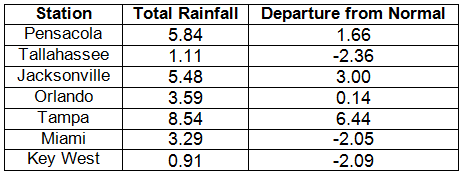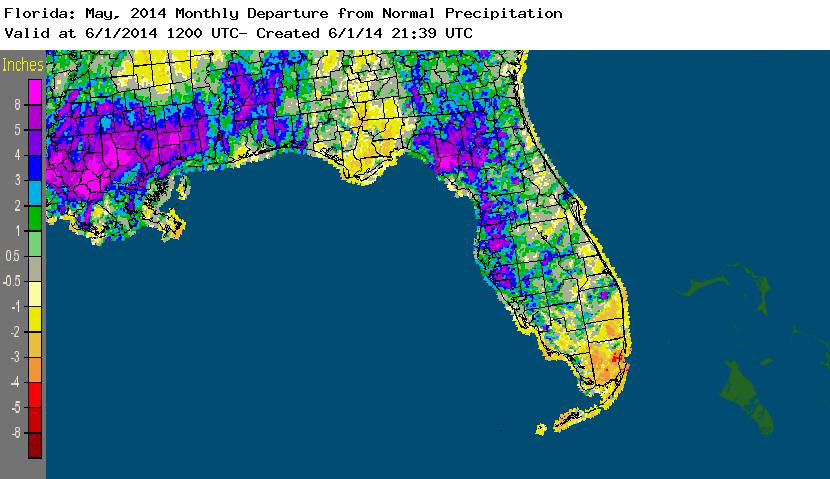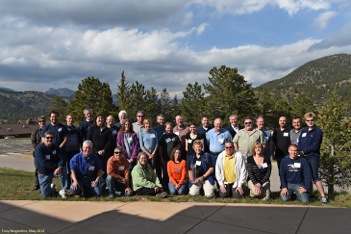Dear Florida Climate Center Friends,
We'd like to present you with the June 2014 edition of our newsletter. In this newsletter, you'll find our monthly climate summary, a list of special events that our staff attended, some pictures, and more. If you have any questions, please email us at climate@coaps.fsu.edu.
Thanks,
The Staff of the Florida Climate Center
 |  |  | David Zierden
State Climatologist | James O'Brien
Professor Emeritus | Melissa Griffin
Asst. State Climatologist |
|
May Climate Summary for Florida
The Florida Climate Center's May 2014 Florida Climate Summary is now available. The summary provides an analysis of temperature and precipitation trends across the state, along with data on hazardous weather, drought, the impacts of the weather and any records tied or broken for the month. During April, average temperatures and rainfall totals varied across Florida. ENSO-neutral conditions are continuing in the equatorial Pacific. The Climate Prediction Center (CPC) predicts above normal temperatures and normal precipitation for the state through August. Past summaries are archived here.
| May average temperatures and departures from normal (°F) for select cities. |  |
| May precipitation totals and departures from normal (°F) for select cities. |  |
| A graphical depiction of the monthly rainfall departure from normal (inches) for May (courtesy of NOAA, NWS). |  |
|
|
Update on the Current Situation of El Niņo
An El Niņo Watch was issued by the Climate Prediction Center back in March and continues to remain in effect as all eyes are on the equatorial Pacific to see how strong the upcoming El Niņo could be.
State Climatologist David Zierden has a special report on the developing El Niņo:
http://climatecenter.fsu.edu/images/newsletter/201406elnino.pdf
|
|
Southeast Climate Consortium Holds Spring Program Review
The Southeast Climate Consortium (SECC) is a multidisciplinary, multi-institutional team that conducts research and outreach to a broad community of potential users in agriculture and natural resource management in the Southeast U.S. The Florida Climate Center and the FSU Center for Ocean-Atmospheric Prediction Studies (COAPS) continue to be key partners in the consortium since its inception in 1998. The SECC met on May 7-9 at COAPS here in Tallahassee for their Spring Program Review. State Climatologist David Zierden and Assistant State Climatologist Melissa Griffin attended the meeting and presented on Florida Climate Center activities. David Zierden began the meeting with a presentation on the current and forecasted state of the Pacific Ocean and the possible development of a strong El Niņo. Melissa Griffin wrapped up the three-day meeting with an overview of the education and outreach efforts of the Florida Climate Center in support of SECC activities.

|
|
Outreach at Local 4-H Agriculture Day
During mid-May, Assistant State Climatologist Melissa Griffin presented at the annual Taylor County 4-H Agriculture Day in Perry, FL. The goal of the event is to have each of the 250 children in attendance to leave with an understanding of how important agriculture and natural resources are to them personally, the county, state, and country. Ms. Griffin presented a segment on how to use weather and climate information to make informed decisions when it comes to agriculture.
|
|
Assistant State Climatologist Attends WERA Workshop
Toward the end of the month of May, Assistant State Climatologist Melissa Griffin attended the annual planning meeting of the Western Education and Research Activity (WERA) 1012 group, a collaborative effort with members from land grant universities across the U.S, the National Weather Service, the National Climatic Data Center, numerous State Climate Offices, and more. The group is tasked with managing, educating, maintaining, and improving volunteer weather observer networks used to collect valuable precipitation data in the U.S. and Canada. This year's meeting highlighted precipitation extremes, collaboration with other environmental citizen science networks, updating infrastructure, and keeping observers engaged and involved in the various programs. Ms. Griffin currently servers as the state coordinator for the Florida CoCoRaHS Network and the previous chair of the Training and Education sub-committee, and will spend the next year working on a variety of projects as part of this corporative effort.

|
|
Department of Health Presents Special Seminars
In conjunction with the Florida Climate Center and the Florida Climate Institute, members from the Department of Health's Building Resilience Against Climate Effects (BRACE) project presented two special seminars at the end of May. The first seminar, presented by Meredith Jagger, Program Manager for BRACE, and Kristina Kintziger, an environmental consultant with BRACE, was focused on examining the relationship between drought and human health implications, mainly in the form of increased instances of respiratory illnesses but also examining impacts of food-borne and waterborne diseases.
The second seminar, presented by Laurel Harduar Moran to the National Weather Services Offices that serve Florida, highlighted the results from a statewide analysis examining the relationship, in Florida, between ambient outdoor temperature/heat index measured at the weather stations and heat-related hospitalizations and emergency department (ED) visits in surrounding populations. The goal of the talk was to provide Florida specific information on the rate of heat-related illness as temperature/heat index increases in order to help inform about the impacts and responses to heat advisories and warnings across the state.
|
|
Upcoming Events
June 8-11, 2014:
21st AMS Conference on Applied Climatology in Westminster, CO
July 9-12, 2014:
Annual Meeting of the American Association of State Climatologist in Stevenson, WA
|
|
Special Report: Hurricane Preparedness
"It Only Takes One;" is the mantra being spoken as we start the 2014 Hurricane Season, which will run until November 30th. The last hurricane to make a direct landfall in Florida was Hurricane Wilma (Category 3) in 2005, and, in the last 9 years, the state has only been impacted by tropical storms. Florida residents are urged to take action and prepare action plans and hurricane kits now so they will be ready in the event of a landfalling hurricane. While current forecast predictions for the season call for a near-normal year in terms of activity, it only takes one landfall to cause havoc; for example, Hurricane Andrew in 1992 occurred during a fairly inactive hurricane season.
Below are some links to information that may help during this year:
Latest Hurricane Season Forecast: http://www.coaps.fsu.edu/hurricanes
Latest Information on Active Tropical Systems: http://www.nhc.noaa.gov
National Hurricane Center Blog: http://noaanhc.wordpress.com
Hurricane Preparedness Information: http://www.nhc.noaa.gov/prepare/
Florida Emergency Management: http://www.floridadisaster.org
Get A Plan - Families: http://www.floridadisaster.org/family/
Hurricane Evacuation Zones and Routes: http://floridadisaster.org/PublicMapping/index.htm
|
|
About Us
The Florida Climate Center is part of a three-tiered system of national, regional, and state climate offices, including NOAA's National Climatic Data Center and the Southeast Regional Climate Center. The Florida State Climatologist and other staff at the Florida Climate Center provide the following information and services to the people of Florida:
· Climate Data:
Historical weather observations for weather stations throughout the state of Florida. We are able to provide data for most stations from 1948-present.
· Climate Information:
Long-term historical averages for various stations, climate divisions, and the entire state.
· Extreme Event Records:
Information and analyses on extreme events such as freezes, droughts, floods and hurricanes.
· Special Analysis:
With their vast knowledge of El Niņo, La Niņa and climate variability, the State Climatologist and staff can offer expert insight into Florida's climate trends.
· Outreach:
Activities, presentations, and workshops that inform and educate the people of Florida about current and emerging climate issues. We also coordinate volunteers for the Community Collaborative Rain, Hail & Snow Network (CoCoRaHS).
More About Us
|
|